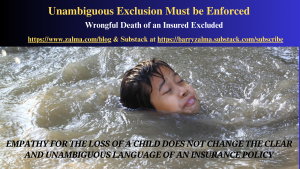Unambiguous Exclusion Must be Enforced

Post 4861
See the full video at https://rumble.com/v5c3lid-unambiguous-exclusion-must-be-enforced.html and at https://youtu.be/_wsrx96gs-o
In B.H., Special Administrator of the Estate of C.W.H., a Minor, and B.H., Individually and for and on Behalf of All the Surviving Heirs-at-Law of C.W.H., a Minor v. P.B. and L.B., and Upland Mutual Insurance, No. 126,874, Court of Appeals of Kansas (August 16, 2024) the Court of Appeals needed to resolve a coverage issue when insurer was asked to pay a judgment rendered against its insured.
GARNISHMENT PROCEEDINGS
A garnishment proceeding in Kansas does not create contractual privity between a judgment creditor and the garnishee. A judgment creditor seeking to garnish a judgment debtor’s insurance provider-when the judgment creditor is not in privity of contract with the insurer and is not an intended third-party beneficiary of the insurance policy-may only recover from the insurer to the extent the insured judgment debtor could recover.
FACTUAL BACKGROUND
Mother’s toddler tragically died from drowning in a pond at the child’s foster parents’ home. Mother sought damages from the foster parents, alleging they negligently caused her child’s death. The district court found one of the foster parents- P.B.-80% at fault for her child’s death and awarded Mother damages of $320,000, comprised of $120,000 for the mother’s survivor claim and $200,000 for her wrongful death claim.
P.B. and L.B. were licensed foster parents who received Mother’s child, C.W.H., as a foster placement in December 2015 when C.W.H. was about one month old. In August 2017, when C.W.H. was about 23 months old, he drowned in a tragic accident in a fishpond on the foster parents’ property when only P.B. was home. At the time of C.W.H.’s death, Mother had been working on her reintegration plan and C.W.H. was spending five nights a week with Mother.
The foster parents were insured under a homeowners insurance policy issued by Upland Mutual. The policy contained the following exclusion: “‘bodily injury’ to ‘you’, and if residents of ‘your’ household, ‘your’ relatives and persons under the age of 21 in ‘your’ care or in the care of ‘your’ resident relatives.”
Upland Mutual notified P.B. and L.B. of this refusal to provide coverage and defense, explaining that C.W.H. was under the age of 21 (he was approximately age 22 months old at the date of the incident), was residing in the household and was in P.B and L.B. care. C.W.H. was also an insured under the policy.
After winning that judgment, Mother sued Upland Mutual, P.B.’s homeowners insurer, in the amount of the judgment against P.B. The district court ordered Upland Mutual to pay Mother $200,000, which represents P.B.’s proportional share of fault on her wrongful death claim. The district court agreed with Mother in part, finding no coverage for Mother’s survivor claim but finding the homeowners insurance policy covered Mother’s wrongful death claim because Mother was not an insured under the policy.
DISCUSSION
The only issue on appeal is whether the district court erred in entering a garnishment order against Upland Mutual for Mother’s wrongful death judgment against P.B. When the facts are undisputed the court need not review the district court’s factual findings and can proceed to the second step to review the district court’s conclusions of law .
The District Court Erred in Finding the Foster Parents’ Homeowners Insurance Policy Provided Coverage for the Judgment on Mother’s Wrongful Death Claim
Upland Mutual’s fairly broad coverage provision is limited by a separate provision that states personal liability coverage “does not apply to: a. ‘bodily injury’ to ‘you’, and if residents of ‘your’ household, ‘your’ relatives and persons under the age of 21 in ‘your’ care ….”
The plain and unambiguous policy language excludes from coverage bodily injuries, including death, to persons under the age of 21 that occurred while the injured was in the care of the insured and a resident of their household. The parties did not dispute that C.W.H. resided with the insureds and thus met this definition under either interpretation. Since the exclusion language in the present case is not ambiguous it was applied as written.
It is axiomatic that when the terms of an insurance policy are clear and unambiguous, the court must give effect to the parties’ clear intentions and enforce the contract as made.
Since the policy clearly excluded from coverage damages resulting from C.W.H.’s death because C.W.H. was residing in the insureds’ home, under the insureds’ care, and under the age of 21, the district court’s garnishment order for Mother’s wrongful death judgment was, therefore, reversed.
The loss of a child is horrible. Judges feel empathy, if not sympathy, to a mother whose child died as a result of a the negligence of others. Judges seldom have empathy for an insurer who refuses to indemnify an insured because of an exclusion. The Trial court ordered the insurer to pay in contravention of a clear and unambiguous exclusion. The Court of Appeals reversed because the exclusion was clear.
I will be appearing on the “Art of Adjusting” podcast The link below is a preview of the podcast that will be posted in full next week. dropbox.com/scl/fi/ldkfrvc
 (c) 2024 Barry Zalma & ClaimSchool, Inc.
(c) 2024 Barry Zalma & ClaimSchool, Inc.
Please tell your friends and colleagues about this blog and the videos and let them subscribe to the blog and the videos.
Subscribe to my substack at https://barryzalma.substack.com/subscribe
Go to X @bzalma; Go to Newsbreak.com https://www.newsbreak.com/@c/1653419?s=01; Go to Barry Zalma videos at Rumble.com at https://rumble.com/account/content?type=all; Go to Barry Zalma on YouTube- https://www.youtube.com/channel/UCysiZklEtxZsSF9DfC0Expg
Go to the Insurance Claims Library – https://lnkd.in/gwEYk
Like this:
Loading…







